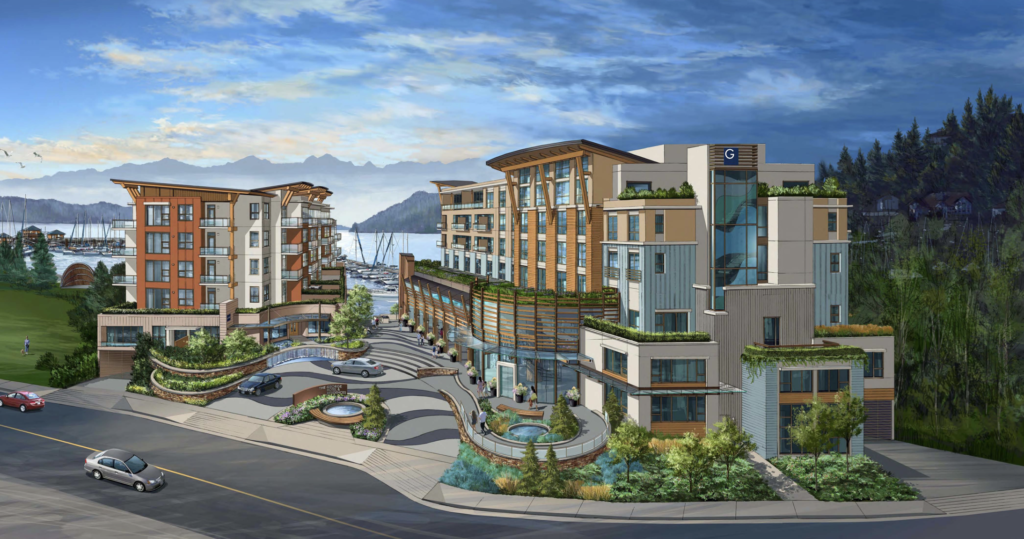
In time of water shortages, recent B.C. courts’ decisions provide Gibsons with new options for Gospel Rock and the George
(By News Desk)
Town councils have the right to change their minds about approved developments and they can put an end to them without financial consequences, the B.C. courts have ruled.
In two recent, separate decisions, the B.C. Supreme Court and the B.C. Court of Appeal sided with the District of Ucluelet and the City of White Rock when they re-zoned land after developments were approved.
In Gibsons, the community has expressed concerns over water supply. The proposed Gospel Rock development allows for 1,100 new dwellings. The newly-proposed George development, with 39 residential units, 111 hotel rooms, 215 parking stalls and a height of 34 metres, would be situated on a critical part of the Gibsons aquifer.
In the case of Ucluelet, the Supreme Court stated that a council is not required by law to provide reasons when it changes zoning bylaws or the Official Community Plan (OCP).
Both the District of Ucluelet and the City of White Rock told the courts they acted in the community’s interest.
The District said a large development of commercial vacation rentals in a nature area was “not in the interest of Ucluelet at this time.” The City of White Rock had “a need for slowing growth.”
Also read: Consultant warns aquifer can sustain only 1,131 more households; OCP allows for 3,599

The situation in White Rock shows similarities to the proposed George development in Gibsons.
Until September 2017, the maximum building height in the White Rock Lower Town area was four storeys. Then council changed the Official Community Plan (OCP) as well as its zoning bylaw to allow for a building of twelve storeys.
In July 2018 developer GSR Capital Group obtained a development permit for a twelve-storey, 30-unit residential building, after years of planning.
Three months later, a newly-elected council downgraded the zoning to a maximum height of six storeys.
Faced with financial losses, GSR took the city to court, arguing the decision was unfair. But both the B.C. Supreme Court and the B.C. Court of Appeal decided that the City of White Rock was within its rights when it changed the zoning in the Lower Town area.
In a statement, GSR said it was “shell-shocked” by the decision.

The case in the District of Ucluelet bears some similarity to Gospel Rock.
In 2005, the District of Ucluelet amended its OCP and zoning bylaws to allow for development of a 375-acre lot on the Ucluelet peninsula, a nature area near the ocean. The owner intended to build a luxury resort with a golf course and a high-end subdivision with vacation rentals.
The owner and the District signed a master development agreement, and after he obtained subdivision approval in 2008, the owner installed the required water, sewer and road infrastructure. He also paid the District a cash contribution of $2.5 million.
The impact of more traffic to the area and improvements to a road were controversial in the community.
In 2011, Ucluelet council approved a bylaw which said the master development agreements could be altered if the development did not go ahead within five years.
The owner encountered financial difficulties and the project stalled. In 2014, Onni Wyndansea Holdings Ltd. bought the property in a court-ordered sale.
When Onni applied for building permits for residential and commercial vacation rentals in 2021, the District of Ucluelet denied the permits and instead downgraded the 375 acres back to its original rural residential zoning. It said there was no need for the proposed development in the District at this time.
The new zoning substantially devalued the land, and Onni took the District to court.
Last month, the B.C. Supreme Court decided the District had the right to rezone the land and amend its OCP. It also clearly stated that Onni was not entitled to compensation for its losses:
“Section 458 of the LGA [editor: Local Government Act] provides that no compensation is payable to an owner of land for any reduction in the value of a person’s land that may result from the adoption of an OCP or a zoning bylaw,” the decision read.
What wonderful news! I am so pleased to learn this and appreciate your sharing the information as the Town of Gibsons used this “excuse” to not back down on developments even when new information came to light to make them unreasonable.
Has there been an appeal?
Yes, developer GSR Capital Group lost its case against the rezoning in White Rock on appeal as well. Both the B.C Supreme Court and the B.C. Court of Appeal said a municipality has the power to rezone even after a developement permit has been issued. — News Desk
Hooray!
I would like to see our new council address the question raised by Mr.Beaver’s well reasoned analysis of earlier this year suggesting that the OCP population limit of around 15,000 is way above the limit of our water supply (around 10,000). It is not sufficient to dismiss the question as Mr. Machado did in his letter by saying that the data Mr. Beaver relied upon was “vastly incomplete”.
Let’s have a another look at this issue with the latest data and avoid the excuse for not doing so because of the fashion to see everything in the light of affordable housing at the expense of all else.
Interesting insights. It will indeed be interesting to see how this latest iteration of council deals with the hard issues. Will there be more recusals? Greater openness and transparency? Genuine community engagement?
The risks to the town’s irreplaceable and precious water supply cannot be simply acknowledged. They must be addressed. However, there is no engineer who will attest to there being no risk and most certainly no person will – or can – provide real and meaningful guarantees.
It is possible that the unique waterfront site – in the case of the latest condos and possible hotel scheme – is simply not able to accommodate the project due to the physical limitations of the subsurface aquifer structure. Council will have to weigh the potential threat to its future water supply versus approving a massive waterfront development. Is it right for council to gamble, understanding there is no certainty here?
We were told, years back, that an engineer had approved everything and there was no threat to the aquifer. I never believed that.
This is definitely wonderful news. Thank you for publishing this and I will sent it to others who will also be overjoyed.
Definitely good news to read that old decisions made by prior councils can be overturned due to changing circumstances and certainly good ammunition to go after that behemoth “the George” which is again rearing its head asking for a new Development Permit so it can put a gargantuan eyesore on Gibsons waterfront and next to our main park which is slated to get trashed so one guy can fill his pockets with cash so he can buy stuff.
Let’s not let him get away with it.
I hope the Town of Gibsons Mayor and Council will do what’s needed to be done
Thanks for writing this article💕
The town needs to seriously re think any project being built on top of our Aquifer. There are 2 developments proposed for our waterfront right now that require serious due diligence. This article proves that our mayor and council can retract a bad decision made so many years ago. Now we have a drinking water state of emergency on the Coast and because the SCRD is tapping into lobes of the aquifer this is not just a Gibsons decision. Our drinking water takes precedence over any development.
Not that it addresses the particular issues with these two projects, but if localities are able to change zoning and building heights after approval, could they not also retroactively require water catchment systems for all approved new developments?